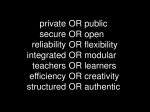Years ago I remember my education professor talking about the “tools” that I would need to carry with me as a student teacher. The curriculum lab at my college was the source for all the materials and supplies that I would need to prepare to become an elementary teacher. I spent hours pouring through files, exploring the cabinets for objects to complete a learning center and for BOOKS to generate interest in the new unit that I had created. Information about this new experience, student teaching, was found in her office in the lab. This incredible center of information was available to students during school hours and periodically during the weekend. Grades were kept in a secret compartment in the professor’s office, which was certainly off limits and unknown to me until the end of the semester. The Blackboard was a place to project sheets from the overhead or to scribble notes to copy! The toolbox that I would use with my new third grade class closely mirrored that which my professor used with me. Welcome to the 1980’s!
lab at my college was the source for all the materials and supplies that I would need to prepare to become an elementary teacher. I spent hours pouring through files, exploring the cabinets for objects to complete a learning center and for BOOKS to generate interest in the new unit that I had created. Information about this new experience, student teaching, was found in her office in the lab. This incredible center of information was available to students during school hours and periodically during the weekend. Grades were kept in a secret compartment in the professor’s office, which was certainly off limits and unknown to me until the end of the semester. The Blackboard was a place to project sheets from the overhead or to scribble notes to copy! The toolbox that I would use with my new third grade class closely mirrored that which my professor used with me. Welcome to the 1980’s!
Over the course of the last thirty years, I have embraced staff development in many different forms. The 180 points necessary for teachers in Virginia to maintain a state teaching license requires me to take a three credit course every five years. While many teachers lament over both the cost and the time involved in taking a course, I have enjoyed the experience of returning to the classroom. It’s refreshing to be on the other side where I am not in charge of planning and implementing the class. Most of these classes supported me as an educator. While content reflected contemporary thought and movement in the world of education, implementation and assessment did not.
Eleven courses and five universities later, I am introduced to the concept of a learning management system! In fairness to the first two courses and universities of my graduate experience, a management system did not exist. Imagine my surprise when learning that one did during the last several years! Hey, this doesn’t sound too bad, I think! No longer am I a prisoner of the ditto system of paper management. I have one location to open to find everything that I will need for the course, providing that the professor knows how to use the system and does so routinely. I like to work during the weekend and into the evening, which is perfect when the LMS is functioning correctly. I am a big picture person. It’s important for me to be able to see where I will go during the semester, where I have been and how to plan my work accordingly. This is perfect when the professor is willing to post materials ahead of time and when materials remain after the class is over. All of this sounds perfect for the student who enjoys the professor who is the sage on the stage, the fountain head for all knowledge, and for students who resemble baby birds waiting for regular feedings. In the year 2012, I am not interested in a culture of dependency, but rather wish to maintain a sense of autonomy.  My learning, when controlled by a traditional management system, resembles the graph of learning “ups and downs” vs. one of exponential growth.
My learning, when controlled by a traditional management system, resembles the graph of learning “ups and downs” vs. one of exponential growth.
Blackboard could easily become the “mother ship” where students dock on a regular basis. According to Jon Mott,the learning management system employed by many universities does little to encourage students to become independent learners who take responsibility for their learning. As both a 21st Century educator and a life long learner I continuously ask, “What does it mean to learn?” Not only do I question what I give and expect of my students, but also what I am allowed to use as a learner. The ability to connect with people in a variety of different ways means that I need tools, such as Twitter to back channel with classmates or to form relationships with new people through a hashtag. The opportunity to engage in dialog allows me to create and publish ideas in the form blogs and wiki-spaces. The creation of a social bookmarking system and social readers allow me to leverage the network in a way that greatly impacts my research. These tools are powerful to me as a learner and signify that I am taking ownership of my education. Unfortunately, they are not found within the learning management system that is available to me, but is rather a part of the personal learning network that my professors invite me to create!
Mott suggests in order for learning to persist over time that students must have access to people, content and ideas. His talk, The Genius of “And,” explores the idea that Learning Management Systems and Social Network Sites do not necessarily need to be viewed as an either/or situation. I understand the legal and ethical reasons for controlling the flow of information from the university to the outside world. Universities and learners do not need to align themselves as in political parties. Educators do not need to fall into the “this or that” path of thinking.
As a young child, I was fond of daydreaming. It was not uncommon for me to hear an adult tell me to pull my head out of the clouds and to return to earth. Mott suggests that we consider integrating an Open Learning Network, which couples a secure, traditional system with an open “cloud-like” system. The “cloud-like” system would allow me to create my own content. I am intrigued by the “middle ground” which employs the best aspects of both systems. This short interview presents BYU’s Loosely Coupled Gradebook System. I think that the subtle way in which the interviewer counters Mott is rather hilarious and found it both entertaining and to the point. I was raised during The Free To Be, You and Me educational philosophy of the 1960’s and 1970’s. (Hey, a few of my teachers were hippies! I loved them!) Unfortunately, that movement has long been replaced by stringent standards for learning in both the public school setting and institutions of higher learning. While I understand that academic institutions have standards to uphold, I know that I am thriving in an atmosphere that couples the best of both the LMS and The Clouds! (My apologies to Judy Collins.) Send in the clouds…don’t bother they’re here… 


In the year 2012, I am not interested in a culture of dependency, but rather wish to maintain a sense of autonomy.
I love that Laurie! You are also proving one of the idea behind andragogy!
I learn so much from your blogs and they always give me something to think about. I really enjoyed the video on BYU’s new system. I love how it combines an LMS with the SNS we are learning to use ourselves. The teachers are empowering their students to learn even more than the coursework, which is so wonderful. Also the interviewer’s ever-changing mug was hilarious.
LikeLike
I’m glad that you had time to open the links. I am never certain if they are opened. Let’s face it, people are busy and links can be very distracting to some readers. I become one of those readers who is now terribly disappointed when there is nothing to open, nothing to explore….Wasn’t the mug great? I was laughing so much that I wondered if my family members thought that I was crazy! (P.S. Have you had the Andragogy “debate” in 601 yet?)
LikeLike
Laurie – its great to hear you reflect on the changes that you’ve experienced over the years. You’ve mentioned how you are using the different tools we are learning about and seem to have a good perspective on what works for educator. What I would ask you is what is next? What is needed? What isn’t out there (or at least free and accessible) that would help educators?
LikeLike
Look for next week’s blog-I have a wiki that I will share that would be so helpful for me as a learner and educator!
LikeLike
A thoughtful post. I was another kid that had my head in the clouds for years…and now I get paid to spend time there! 🙂
LikeLike
Maybe one day I will be there as well! :>)
LikeLike
Great post, Laurie! As usual. 🙂 I, too, thought about the principles of andragogy when I read your statement regarding the need for autonomy. This is SO TRUE of adult learners! I agree with Melissa- your blogs are always so reflective really give readers some valuable “food for thought”.
LikeLike
Jess, I find that when I read the blogs that my classmates write, that they provide food for thought, ideas to consider and roads to follow! I’ve enjoyed following your trails, too!
LikeLike